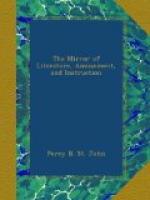* * * * *
MARY OF CAMBRIA.—A SONNET. (For the Mirror.)
There was a maiden once would come and
sit
Upon our mountain, the long summer day;
And watch’d the sun, till he had
beauteous lit
The mist-envelop’d rocks of Mona
grey:
Beneath whose base, the timid hinds would
say,
Her lover perish’d; and from that
dread hour,
Bereft of reason’s mind ennobling
ray,
Poor Mary droop’d: Llanellian’s
fairest flower!
Why gazeth she thus lone; can those soft
eyes
Interpret aught in each dim cloud above?
Yes, there’s more joy in her wild
phantasies
Than reasons in its sober power could
prove.
List to her wild laugh now; she smiles
and cries,
It is my William’s form; he beckons
from you skies.
The Author of a Tradesman’s Lays[4]
[4] In our correspondent’s
notice of Mrs. Hemans in No. 550, for
“Lady then,” read
“this Lady.”
This little metrical record is founded on fact. In the year 1808, a young female visited the grey, sterile mountain tract of Cefu Ogo, in Denbighshire, each day successively for two months. Her lover, who was a seaman on board one of the Welsh traders, had often met her there, and a tranquil, uninterrupted walk it afforded them, for exchanging the reciprocities of their mutual affection. He was lost not far from the iron-bound coast of Carnarvonshire, but nearer towards Anglesea. I saw her frequently, and her demeanour was most peaceable, except towards the evening, when her benighted fancy would conjure up a variety of pleasing expressions, which were uttered in the Welsh language; and were invariably directed towards her lover, whom she often fancied was present with her. I was happy to hear, that through the kind superintendence of the late Dr. Jones, of Denbigh, she in a great measure recovered her faculties, but died two or three years after at Liverpool.
* * * * *
SHAKSPERIANA.
(For the Mirror.)
“Each scene of many-colour’d
life he drew
Exhausted worlds,—and then imagin’d
knew.”
JOHNSON.
So much has been said, and said so well, respecting the writings of Shakspeare and the peculiar character of his genius, that it would be a hopeless as well as a presumptuous task to attempt adding anything to public information on that head. But I know not that any one has ventured to point out a few of those instances in which our great dramatist has stooped to plagiarize. That he must have done so, at least occasionally, is a matter of course, as no voluminous writings were ever given to the world that were not the result of study as well as original thought, for genius must ever be corrected by judgment, and what is judgment but the child of experience and study?




